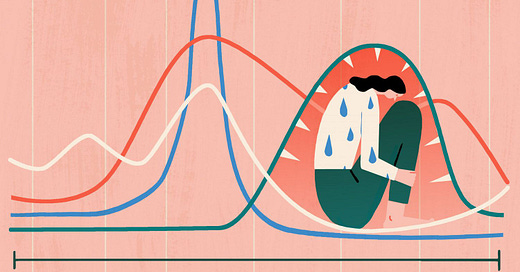Women have been suffering from PMDD for far too long.
I have learned so much from the people who follow me. For the past couple of years, my TikTok notifications have been inundated with tags, alerting me to videos of people talking about their health or potential treatments for their ailments. One of the more recent conversations I have seen online lately is people recommending Pepcid to treat Premenstrual Dysphoric Disorder (PMDD).
Does it work?
Before we dive in, I want to make a quick disclaimer. I am not an expert on PMDD. My expertise is on the function of histamine given my background in Allergy & Immunology. This post is not meant to be specific medical advice, but for educational purposes only. Any concerns should be directed towards your personal physician. The goal of this post is to raise awareness about this question in hopes that someone would be interested in studying this further.
What is PMDD?
PMDD is the most severe form of premenstrual syndrome (PMS). Women may experience physical and mood changes during the days leading up to menstruation. The American College of Obstetricians and Gynecologists (ACOG) define PMЅ as the presence of at least one symptom occurring in the five days before a menstrual period and end within four days after a period, which leads to some interference in normal functioning.
The DSM-5 criteria for PMDD can be found here, but here is a summary of some of the key symptoms that may be experienced:
At least one of the following should be present:
Mood swings, sudden sadness, increased sensitivity to rejection
Anger, irritability
Sense of hopelessness, depressed mood, self-critical thoughts
Tension, anxiety, feeling on edge
At least 5 of the following should be present as well:
Difficulty concentrating
Change in appetite
Diminished interest in usual activities
Easy fatigability, decreased energy
Feeling overwhelmed or out of control
Breast tenderness, bloating, weight gain, or joint/muscle aches
Sleep changes
What causes PMDD?
Unfortunately, the underlying mechanism of PMDD, also known as the pathophysiology, remains unknown. However, there are several key observations and hypotheses that have been made previously.
People suffering from PMDD may have an abnormal central nervous system (CNS) response to normal hormonal fluctuations that occur during the menstrual cycle. They may be sensitive to changes in estrogen and progesterone. Studies have shown that women with PMDD have altered sensitivity to these hormones, which affect the neurotransmitters serotonin and gamma-aminobutyric acid (GABA).
An imaging study found that women with PMDD have increased serotonin transporter binding in parts of the brain during the luteal phase that correlate with depressive symptom severity.
PMS and PMDD may be inherited as well.
However, there may be a basis for the chemical histamine in promoting symptoms of PMDD. While histamine is often known for its ability to cause allergy symptoms such as sneezing, runny nose, hives and itching, it also has several other key functions. Histamine stimulates acid secretion in the stomach. It acts as a neurotransmitter in the brain to help regulate appetite and wakefulness.
In one study that was in a mouse model, histamine was shown to have excitatory effects on the brain and can be influenced by the hormone estrogen. Another study reported that during the menstrual cycle, changes in estrogen can lead to variations in histamine levels. It appears that histamine and estrogen may go hand in hand.
Pepcid and PMDD, does it work?
I have seen many women on social media posting their stories about living with PMDD and that taking Pepcid (famotidine), has significantly helped their symptoms. How could an antacid possibly work?
Pepcid is an antacid, but its underlying mechanism is blocking histamine receptors, specifically H2. There are four histamine receptors: H1, H2, H3, and H4. H1 regulates immune responses that you see in allergic reactions and commonly taken antihistamines such as Benadryl (diphenhydramine), Zyrtec (cetirizine), Claritin (loratadine) and Allegra (fexofenadine) block the H1 receptor.
There are H2 receptors in the brain. Therefore, it is plausible that Pepcid could help treat symptoms of PMDD. However, there are some important caveats to consider.
There are no randomized, double-blinded, placebo controlled clinical trials comparing Pepcid to a placebo to treat PMDD in a large number of individuals. It is possible that taking Pepcid could act as a placebo effect since it has not been studied closely.
What is the optimal dose and frequency? Should you take Pepcid 20 mg twice daily? 40 mg daily? When should you start taking the medication? Should you take it five days before your menstrual period?
While Pepcid is generally well tolerated by most people, it can cause headaches, dizziness and constipation. It may interact with some of your medications because it could decrease the absorption of some medications due to decreased stomach acid production. It is best to talk with your doctor about using this medication.
Final thoughts
I believe that it is worth experts putting in the time and effort to study this potential relationship between histamine and PMDD further and formally studying Pepcid as a treatment option for PMDD. I hope this post raises awareness towards this issue so that it can get more attention. Thank you to all who have shared their stories because your voice matters.
Please share this post with your friends and family if you found this helpful and subscribe to stay informed and learn more about your health. While it is not required, any contributions would be helpful and greatly appreciated. I often have to pay out of pocket to get access to research articles for my educational posts.





As someome who has PMDD, the only thing that ever helped me is not ovulating.
As a female who suffers from PMDD this is very interesting! 🤔 I’ll keep my eye on this!